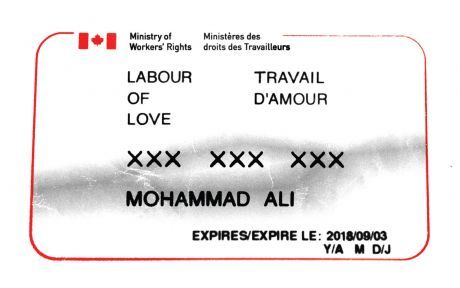Arts
You are here
Socialist Hip Hop – Labour of Love review

October 28, 2018
At the October 25th launch event in Toronto, I asked The Socialist Vocalist AKA Mohammad Ali what local underground talent he is impressed by. His face went wide eyed, as if the list of talented working musicians was a mountain in his head. This brief pause is a good snapshot of Ali – a working artist who tirelessly channels the popular rage and love in the political struggles of our time. (Ali named THEO3, Toronto's FreedomWriters supergroup, Solidarity Squad, and Ian Kamau).
Ali's solidarity extends far beyond the musical realm. Activists in Ontario will recognize him from performances at key actions, including the June 16 Rally for Decent Work and last year's OFL Young Worker's Assembly. After being completed for two years, Ali has finally collected the art, resources, and infrastructure to put Labour of Love out properly. The project is not limited to the album, with other artistic pieces, merchandise, and an excellent lyric and art book supplement.
The music is relentlessly political. This does not mean emotionless or dry. On the contrary, Ali understands that songs are not seminars. “Music has to be emotionally honest,” Ali explains. “You can't just put a press release out over music and have it connect with people. You need to tell stories that really connect with people, that really pull on heartstrings, and make it real. Make it tangible.”
Ali lives the life he raps about in his songs, present on the title track. “Report in for my shift/ a couple more months/ I can afford another trip/ Disneyworld, me and my little girl/ Disneyland, me and the little man/ Next year, maybe we won't need the rental van.” These scenes quickly resonate with listeners in a way that other media cannot. “Labour of Love” along with “Solidarity Forever” featuring Ayesha Adhami are the most soulful on the record, and demonstrate Ali's versatility.
Still, Ali is a socialist entrenched in the books as well as the streets. On a wide-spanning interview with Talking Radical Radio with Scott Neigh, Ali said that his exposure to Che Guevara's Motorcycle Diaries gripped him. Ali spent two years in the rap scene there before moving back to Canada. He weaves experiences with political literature, as in, “Never had a dad/ so I adopted Frederick Douglass.”
The radical politics junkie will have to listen several times before appreciating every historical reference. Ali says he draws immense thematic inspiration from Fred Hampton and the Black Panthers. As a young man facing racism in small-town Ontario in the '90s, Ali gravitated towards rap as a way to understand his experiences. He also credits Malcolm X's autobiography as a big part of his political development in youth, and refers several times to Vijay Prashad's The Karma of Brown Folk.
Some of the songs on the album center around characters that are vehicles for the larger struggles. The “Dreams” tracks (part I, II, and III) spread out on the album introduce the listener to three different characters and their clash with structural forces in society. Part III introduces a soon-to-retire Steelworker who has his retirement threatened by the Harper government. The Steelworker decided to get very involved in his union at the end of his working life, and was part of a campaign that successfully beat back Harper's attacks. The story is based on a real person whom Ali met years ago through political work.
The relationship with the trade union movement that Ali regularly alludes to is not a one way street. Ali reminded people at the show that it was here where he has been able to find a home and spread his music. Mayworks Festival and the Worker's Arts and Heritage Centre in Hamilton are among the organizations he has previously pointed out for doing it right. This means incorporating the artists' experience into their programs and campaigns, not simply having them perform and leave.
“Some specific unions are really trailblazing in terms of how they work with the arts community,” he says. “CUPE, their cultural program works super seriously at their conventions, at their rallies. Same with OPSEU. Music, visual arts, and collaborative work with artists in general...especially Region 5, OPSEU in Toronto.”
The closing song, “The Karma of Brown Folk”, is quite interesting. Ali has turned the melody from 50 Cent's “Many Men”, a song about gang violence in New York in the '90s, and turned it on its head. The chorus begins, “Many men, is stressed about me/ Love in my eyes, got what they can't see/ I'm trying to breathe, they won't let me be me/ 'Cause people tryin' to take my rights away.” Ali opens the track with a spoken-word quote from Prashad's The Darker Nations. He then moves to explore the pains that racialized people experience in the West. “We're in their households/ But our names, they can't pronounce though/ Samir, not Sammy/ Abdullah, not Abby/ This ain't some rap name/ Born and raised Mohammad Ali”. Ali also calls the listener to ally oneself with today's movements, rapping, “Rock Trayvon's hoodie/ Rock Malala's hijab”.
The song features vocals from Rob GF, who was recently signed to Universal Music Canada. Ali said on Talking Radical Radio that while the vast majority of artists he has met are progressive, they can't all make political music. He asserts that labels have one contract for every 10,000 musicians, and many are not looking for political work. In this sense, Ali's music occupies two spaces – that of precarious labour, as well as steadfast solidarity, despite potential barriers it might present. Ali has no intention of slowing down, and is already hard at work on new albums: Protest Music volumes I, III, and III.
Follow Ali's work on Twitter, Instagram, Facebook, and his site, http://socialisthiphop.com/
Section:










